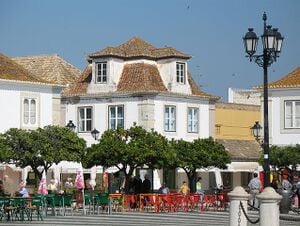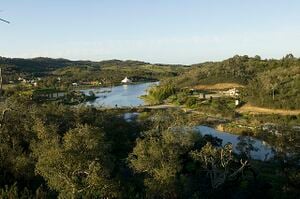
 European nations must end repression of peaceful climate protest, says UN expert, theguardian.com (Feb 28, 2024)
European nations must end repression of peaceful climate protest, says UN expert, theguardian.com (Feb 28, 2024)  A "Miyawaki forest" takes two decades to mature at the heart of a city. In Lisbon, it's burgeoning in two years, The Daily Alternative (Apr 02, 2023)
A "Miyawaki forest" takes two decades to mature at the heart of a city. In Lisbon, it's burgeoning in two years, The Daily Alternative (Apr 02, 2023)  ‘We’ve come so far’: how one village rose from the ashes of a wildfire, Positive News (Feb 24, 2023)
‘We’ve come so far’: how one village rose from the ashes of a wildfire, Positive News (Feb 24, 2023)
Networks and sustainability initiatives[edit | edit source]
- Neighbourhood initiatives across Lisbon
- Lisboa Green Capital 2020 added 16:50, 17 March 2020 (UTC)
- Transição em Portugal
- Transition Resource translations
Participatory budgeting[edit | edit source]
Lisbon's Green PB[edit | edit source]
Starting in 2019 Lisbon City Council's first ever 'green' PB, an initiative supported and managed by South Pole and EIT ClimateKIC's City Finance Lab, has been allocated a €5 million budget to support climate change mitigation and adaptation projects selected by local citizens.
Part of Lisbon City's wider participatory budget, it sets aside funds for projects with positive climate change mitigation and adaptation impacts, such as cycling lanes, tree planting for street heat reduction, or water capture and storage. The impact of the 'green' participatory budget is designed to be two-fold; ensuring constant annual investments into the city's low-carbon transition, whilst also raising awareness among citizens of the benefits of climate change mitigation and adaptation projects.[1]
Cascais participatory budget[edit | edit source]
Cascais participatory budget, 2011 - 2017
Community energy[edit | edit source]
Renewable energy in Portugal was the source for 25.7% of total energy consumption in 2013. In 2014, 27% of Portugal's energy needs were supplied by renewable sources. In 2016, 28% of final energy consumption in Portugal came from renewable sources.
Portugal aims to be climate neutral by 2050 and to cover 80% of its electricity consumption with renewables by 2030.
In 2018, Portugal committed to close all of the country's coal producing facilities by 2030, making it almost completely reliant on renewable energy in the coming years. As of 2019, coal still provided 40% of Portugal's electricity needs. The last Portuguese coal power plant closed on 19 November 2021.
see also: Wind power in Portugal (created 2010)
Climate action[edit | edit source]
Biodiversity[edit | edit source]
Greater Côa Valley rewilding area: Located in Portugal in the Côa Valley on the border with Spain. Rewilding Europe is trying to increase the number of semi-wild livestock such as feral horses and cows. Due to depopulation and land abandonment, there is a significant decrease in grazing, which has caused natural succession and more plant cover in the landscapes. The organisation promotes grazing as a tool to lower the risk of fire. The organisation claims more "wild" livestock will lead to more diverse "mosaic landscapes", which may improve conditions for populations of roe deer and other species including some which are extinct from the region such as Iberian ibex. Besides the promotion of conservation grazing, the organisation is also occupied with promoting ecotourism, advocacy in order to convince the Portuguese government to set aside more land in order to create a biological corridor, and a project to increase number of the wolves in the area. W
Environment quality[edit | edit source]
ClairCity, Eu project about air pollution and CO2 emissions in cities, putting the power in the hands of residents to determine the best local solutions.
Education for sustainability[edit | edit source]
Centro de Educação Ambiental, Torres Vedras
Sharing[edit | edit source]
The People Who Share - Portugal
Resources[edit | edit source]
Video[edit | edit source]
Research[edit | edit source]

Tamera is a self proclaimed peace research village with the goal of becoming "a self-sufficient, sustainable and duplicable communitarian model for nonviolent cooperation and cohabitation between humans, animals, nature, and Creation for a future of peace for all." It is also often called a "healing biotope". Literally translated, "biotope" simply means a place where life lives. In Tamera, however, "healing biotope" is also described as a "greenhouse of trust, an acupuncture point of peace, and a self-sufficient future community." It is located on 335 acres (1.36 km2) in the Alentejo region of southwestern Portugal.
About Portugal[edit | edit source]
Portugal, officially the Portuguese Republic, is a country located on the Iberian Peninsula in Southwestern Europe, whose territory also includes the Macaronesian archipelagos of the Azores and Madeira. It features the westernmost point in continental Europe; its mainland west and south border with the North Atlantic Ocean; and in the north and east, the Portugal-Spain border, which constitutes the longest uninterrupted border line in the European Union. Portugal is the oldest nation-state in Europe. Founded in 1143, its current borders were established in mid-13th century, making them some of the most ancient in Europe and the world. Its archipelagos form two autonomous regions with their own regional governments. On the mainland, the Alentejo region occupies the biggest area but is one of the least densely populated regions of Europe. Lisbon is the capital and largest city by population, and it is also the main spot for tourists alongside Porto, the Algarve and Madeira.
Near you[edit | edit source]
External links
- Cascais, iclei-europe.org, member-in-the-spotlight
- Tamera Healing Biotope I
References
- ↑ sharedfuturecic.org.uk, Oct 2019, p. 4
More here: southpole.com


